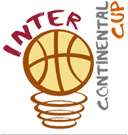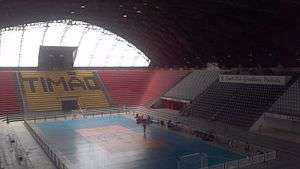FIBA Intercontinental Cup
|
Current season, competition or edition: | |
| Sport | Basketball |
|---|---|
| Founded | 1966 |
| Inaugural season | 1966 |
| Claim to fame | Official Club World Championship |
| No. of teams | 2 |
| Country | FIBA members |
| Continent | Europe, North America & South America |
| Most recent champion(s) |
(1st title) |
| Most titles |
(5 titles) |
| Level on pyramid | 1st tier - Worldwide |
| Official website | FIBA Intercontinental Cup |
The FIBA Intercontinental Cup, commonly referred to as the FIBA World Cup for Champion Clubs, or the FIBA Club World Cup, is a professional basketball competition endorsed by FIBA, FIBA Americas and Euroleague Basketball Company. Historically, its purpose has been to gather the premier basketball clubs from each of the world's geographical zones, and to officially decide the best club of the world, which is officially crowned as the world club champion. The World Cup for Clubs has been contended mainly by the champions of the continents and/or world geographical regions that are of the highest basketball levels.
The league champions of the NBA, which would be considered the top club from the North American zone, currently decline participation. Since the tournament began again with the 2013 edition, the tournament has been played in either an aggregate score two-legged series, or in a single-game final format, that determines the official world club champion.
Through 2015, the champions of Europe's top-tier level EuroLeague participated in the tournament. In 2016, the champions of Latin America's top-tier level FIBA Americas League, played against the champions of Europe's then 3rd-tier level FIBA Europe Cup (FIBA Europe Cup is currently the 4th-tier level European league).[1][2] This was due to the 2015–16 FIBA–Euroleague Basketball controversy, which resulted in FIBA not allowing the EuroLeague champions (EuroLeague is Europe's top-tier level league), who would normally represent Europe in the FIBA Intercontinental Cup, to participate in any FIBA sanctioned events.
FIBA announced plans to expand the tournament to include the champion teams from the FIBA Africa Clubs Champions Cup, the FIBA Asia Champions Cup, the NBL (FIBA Oceania), and possibly the NBA in the future.[3][4]
History
The FIBA Intercontinental Cup competition was originally organized between the years 1966 and 1987. The tournament had its origins with a friendly test game in São Paulo in 1965. The test game was contested by the South American Club Championship champions Corinthians, and the FIBA European Champions Cup champions, Real Madrid. Corinthians won the test game by a score of 118 to 109. After the success of the test tournament, the first official tournament took place in the year 1966.[5]
In 1973, the competition adopted the name FIBA Intercontinental Cup William Jones, to honour the secretary general of FIBA, William Jones. FIBA tried to rebirth the competition in 1996, by reorganizing the Intercontinental Cup into a best-of-three playoff tournament between the winners of the EuroLeague and the winners of the South American League (the champions of all of South America). After that tournament however, the competition was succeeded by the McDonald's Championship, which preexisted and included NBA clubs. The McDonald's Championship however, was not an official tournament like the Intercontinental Cup.
In August 2013, an agreement reached between Euroleague Basketball Company, FIBA Americas, and FIBA, allowed for the World Cup for Champion Clubs to be relaunched, and to be played between the EuroLeague champion and the FIBA Americas League champion.[6][7] Later in 2013, it was announced that FIBA had plans to expand the tournament, adding the champion teams from the FIBA Africa Clubs Champions Cup, the FIBA Asia Champions Cup, the NBL (FIBA Oceania), and possibly the NBA.[8][9]
In 2016, the tournament changed format, with the champion of Europe's then 3rd-tier level league, the FIBA Europe Cup (FIBA Europe Cup is currently Europe's 4th-tier level league), representing Europe. From 2017 onward, the champions of Europe's current 3rd-tier level league, the Champions League, can represent Europe, rather than the champions of Europe's top-tier level league, the EuroLeague, which traditionally represented Europe in the FIBA Intercontinental Cup.[10][11] This change was done because FIBA refused to allow the EuroLeague champions to participate in the tournament, due to the ongoing FIBA–Euroleague Basketball controversy.
Names of the competition

- FIBA Intercontinental Cup (or FIBA World Cup for Champion Clubs): (1966–1980)
- FIBA Club World Cup: (1981)
- FIBA Intercontinental Cup (or FIBA World Cup for Champion Clubs): (1982–1984)
- FIBA Club World Cup: (1985–1987)
- FIBA Intercontinental Cup (or FIBA World Cup for Champion Clubs): (1996, 2013–present)
- Since 1973, the tournament has also been named in Honor of Renato William Jones, so the tournament's full official names would be either FIBA Intercontinental Cup "William Jones", or FIBA Club World Cup "William Jones".
- The tournament is also referred to as the FIBA Intercontinental Cup of Clubs, in order to avoid confusion with the 1972 FIBA Intercontinental Cup of National Teams.
Title holders
|
|
|
Finals

The FIBA Intercontinental Cup unofficially began with a friendly test game in São Paulo, Brazil, in 1965. The game was played by the defending champions of the South American Club Championship, Corinthians, and the defending champions of the FIBA European Champions Cup, Real Madrid. It was held at the Ginásio Principal. Corinthians won the game 118 to 109. Due to the test tournament's great success (attendance for the game was over 10,000), the FIBA Intercontinental Cup was made an official annual tournament by FIBA. The first official FIBA Intercontinental Cup tournament was then held the following year.[12]
| Unofficial (1965) | |||||
|---|---|---|---|---|---|
| Year | Final | ||||
| Champion | Score | Second place | |||
| 1965 Details |
Corinthians |
118–109 | Real Madrid | ||
Titles by club
| Rank | Club | Titles | Runner-up | Champion Years |
|---|---|---|---|---|
| 1. | |
5 | 2 | 1976, 1977, 1978, 1981, 2015 |
| 2. | |
3 | 4 | 1966, 1970, 1973 |
| 3. | |
3 | 1967, 1968, 1969 | |
| 4. | |
2 | 1 | 1975, 1982 |
| 5. | |
1 | 2 | 1979 |
| 6. | |
1 | 2 | 1983 |
| 7. | |
1 | 1 | 1980 |
| 8. | |
1 | 1 | 1985 |
| 9. | |
1 | 1974 | |
| 10. | |
1 | 1984 | |
| 11. | |
1 | 1986 | |
| 12. | |
1 | 1987 | |
| 13. | |
1 | 1996 | |
| 14. | |
1 | 2013 | |
| 15. | |
1 | 2014 | |
| 16. | |
1 | 2016 | |
| 17. | |
2 | ||
| 18. | |
1 | ||
| 19. | |
1 | ||
| 20. | |
1 | ||
| 21. | |
1 | ||
| 22. | |
1 | ||
| 23. | |
1 | ||
| 24. | |
1 | ||
| 25. | |
1 | ||
| 26. | |
1 | ||
| 27. | |
1 |
Titles by country
| Rank | Country | Titles | Runners-up |
|---|---|---|---|
| 1. | |
7 | 5 |
| 2. | |
6 | 3 |
| 3. | |
5 | |
| 4. | |
2 | 8 |
| 5. | |
2 | |
| 6. | |
1 | 4 |
| 7. | |
1 | 1 |
| 8. | |
1 | |
| 9. | |
1 | |
| 10. | |
1 | |
| 11. | |
1 | |
| 12. | |
1 | |
| 13. | |
1 |
Top scorers of the decisive game
MVP awards
1972 special version
In 1972, FIBA held a 4 team tournament, featuring the Soviet Union national basketball team, the Polish national basketball team, the Brazilian national basketball team, and the NABL All-Stars Team, which participated in the place of Team USA. Although this tournament is not a part of the actual Club World Cup, it is still listed in the event's history as a special version of the tournament, while the actual club competition was on hiatus between the years of 1970 and 1973.[18]
References
- ↑ Fraport Skyliners to host Guaros de Lara in FIBA Intercontinental Cup.
- ↑ Fraport to represent Europe in the Intercontinental cup.
- ↑ Esportes.Opovobr Com Copa Intercontinental, Fiba ensaia Campeonato Mundial. (in Portuguese)
- ↑ Estadao.com Pinheiros e Olympiacos começam a disputar o título da Intercontinental. (in Portuguese)
- ↑ Basquetepinheirense Especial Mundial: O Mundial é nosso!. (in Portuguese)
- ↑ FIBA - Intercontinental Cup of Clubs re-launched; FIBA, 5 August 2013
- ↑ Euroleague.net Intercontinental Cup of clubs re-launched.
- ↑ Esportes.Opovobr Com Copa Intercontinental, Fiba ensaia Campeonato Mundial. (in Portuguese)
- ↑ Estadao.com Pinheiros e Olympiacos começam a disputar o título da Intercontinental. (in Portuguese)
- ↑ Fraport Skyliners to host Guaros de Lara in FIBA Intercontinental Cup.
- ↑ Fraport to represent Europe in the Intercontinental cup.
- ↑ Basquetepinheirense Especial Mundial: O Mundial é nosso!. (in Portuguese)
- ↑ FoxSports.com O Herói e o Vilão de Olympiacos 86 x 69 Pinheiros, pelo Mundial de Clubes. (in Portuguese)
- ↑ Gazetaesportiva.net Olympiacos bate Pinheiros e vence Copa Intercontinental. (in Portuguese)
- ↑ Fla derruba o Maccabi e fatura o maior título de sua história no basquete. (in Portuguese)
- ↑ Con Nicolás Laprovittola como MVP, Flamengo se consagró campeón Intercontinental. (in Spanish)
- ↑ "Guaros de Lara win Intercontinental Cup, 74-69 vs Skyliners Frankfurt". Sportando.com. 18 September 2016. Retrieved 18 September 2016.
- ↑ LinguaSport.com VI Intercontinental Cup (São Paulo 1972).
External links
- FIBA Intercontinental Cup official website
- FIBA Intercontinental Cup History
- Basquetepinheirense FIBA World Cup (in Portuguese)
- FIBA World Cup of Clubs
- FIBA World Cup of Clubs (in Portuguese)